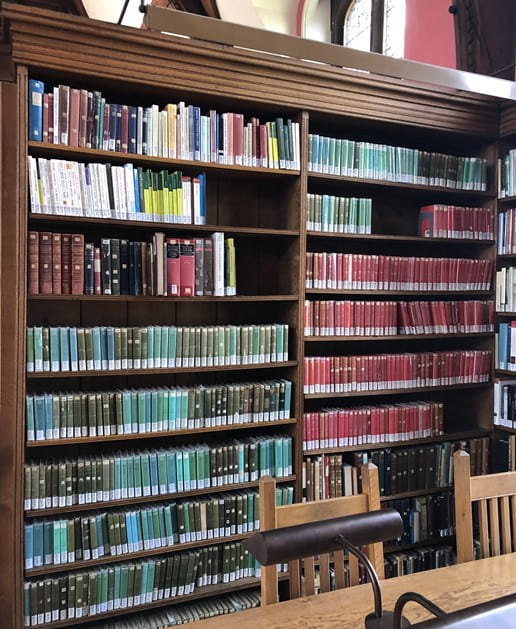Photo: Old Court, Pembroke College, University of Cambridge (Author Provided)
Supervisions at Cambridge
By James Nycz
Studying abroad had been a goal of mine before I even arrived at Penn, but through my Classics courses I realized that studying abroad in Europe would allow me to explore a whole new experience of Classics. Not only would I actually be able to live in and visit the same places where the boundaries of Rome once extended, but I would also be able to witness and understand the long tradition of Classical scholarship that still exists in places like Britain. I chose to study for a semester at Pembroke College, University of Cambridge where there was no lack of this history given the centuries long history of their department. At one of the top Classics departments in the world, I was able to meet and interact with giants of scholarship on Roman history and archeology.
However, one of the biggest differences in culture for me was not related to the department specifically, but to the University’s unique style of undergraduate teaching: supervisions. Coursework is structured mainly around these supervisions — in my case, weekly one-on-one meetings with an instructor from the department on Roman history — with associated lectures on the broader material, but overall less essential. This flipped my expectations on its head, since my Penn classes had been structured completely differently, but I did begin to enjoy this learning style. Not only were these lectures engaging, my lecturer was the world-renowned Classicist Mary Beard! With the lectures as a supplement, I was able to dive deep into smaller topics in my supervisions. Very focused on argumentation through essay writing, I was challenged to make original arguments and defend them in these one-on-ones. Though definitely a daunting task, I felt that I had a lot more freedom to explore my intellectual interests in these supervisions and the conversational style of this method helped me to feel comfortable by creating a friendly atmosphere.
Of course, I was able to do my fair share of sightseeing and traveling while I was there. Some of the big attractions at Cambridge in the Classics are the Fitzwilliam Museum (focused on Art) and the Museum of Classical Archaeology, located in the Classics building, with many examples of Classical sculpture reproductions. For one of my supervisions — that week’s topic being the archeology of the “Augustan Revolution” in the provinces — I was able to travel to the British Museum in London to gain a deeper understanding of the material evidence from this period. I also took a short vacation from classes to go and visit Toulouse, France, for a long weekend. Toulouse, having been a city in the Roman province of Gallia Narbonensis, has a long history and I was able to see a glimpse of the city’s ancient past at the archeological museum, the Musée Saint-Raymond.
Though I certainly spent my fair share of time in the library, studying abroad was one of the most rewarding experiences of my life. Especially as a Classics student, I was able to gain a whole new perspective on the Classics through a new educational system and by engaging with the ancient world on a first-hand basis. Most importantly though, I think, in studying abroad is the friendships that you’re able to make while you’re there. As a fully-matriculated member of Pembroke College, I joined a lifelong community within the collegiate system at Cambridge. I got to forge friendships with British and international students studying at the College. We spent plenty of time hanging out in the College’s undergraduate parlour that houses a daytime cafe which becomes a bar at night. Pembroke is also special because it is one of the only Cambridge colleges that still hosts formal hall every night — a three course formal dinner for which you have to dress up and wear your undergraduate gown. The sense of tradition was evident throughout life at the nearly 700-year-old college, with all students even receiving a copy of a book on the history of the college upon matriculation.
Regardless of what you are studying, spending a semester abroad is such a unique opportunity available to college students. For Classics students in particular, these global experiences are adventures that will not only add immensely to your personal college experience, but also to the breadth and depth of the education that you receive. As I myself learned, this experience does not have to be limited to Rome or Greece—throughout the world, there are a variety of perspectives in Classics to be gleaned. Studying abroad in England was one of the most enriching experiences I have had at Penn, and I truly encourage anyone even entertaining the idea to make the leap—across the pond.
Pictures:
Old Court, Pembroke College, University of Cambridge (Author Provided)
Busts of Livia and Julius Caesar, Left and Right Respectively, at the Fitzwilliam Museum (Author Provided)
Classics Section of the Pembroke College Library (Author Provided)
Mosaic of Thetis and Triton, Musée Saint-Raymond, Toulouse, France (Author Provided)

James Nycz sporting his BA gown before Pembroke College’s Matriculation Ceremony (Author Provided)
James Nycz (College ’21) is a student at the University of Pennsylvania studying Political Science and Classical Studies.



